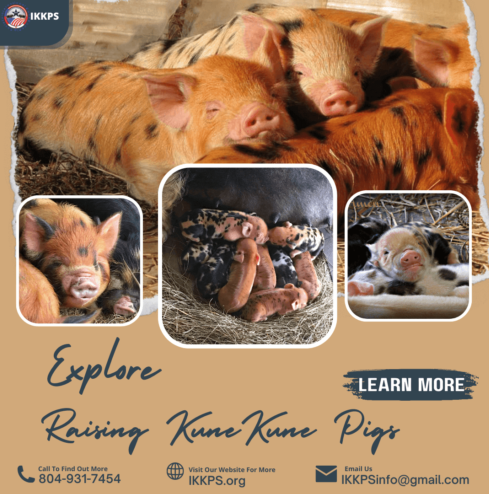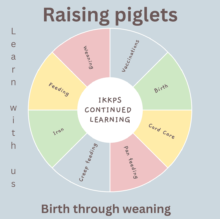
JOIN US
GET OUR KUNEKUNE
NEWSLETTER
New and highly discounted products, fresh and hot stories & useful information
Raising KuneKune pigs and piglets
Ready to embark on the journey of raising KuneKune pigs and KuneKune piglets? This guide is your go-to resource for all things KuneKune, providing valuable insights and practical tips for success.
See at the end for information about the video - Raising KuneKune piglets from birth through weaning.

Ready to embark on the journey of Raising KuneKune piglets?
From Squeals to Snouts:
A Beginner's Journey in Raising KuneKune pigs and piglets.
Embarking on the journey of raising KuneKune piglets may seem daunting at first, but it is an enriching experience that promises countless rewards. From their adorable squeals to their curious snouts, these little creatures have a way of capturing your heart and transforming your perspective on farm life. In this captivating guide, we will delve into the world of piglet rearing, unveiling the joys, challenges, and invaluable lessons that come with it. Whether you are a seasoned farmer looking to expand your livestock or a city-dweller with a newfound fascination for these intelligent animals, this beginner's guide is the perfect resource to help you navigate the ins and outs of raising KuneKune piglets.
Get ready to roll up your sleeves, dive into the world of pig farming, and discover the secrets to nurturing healthy and happy piglets that will make your farm thrive. Are you ready to embark on this exciting journey? Let us dive in and unlock the mysteries of raising these incredible creatures!
The Benefits of Raising Piglets
Raising piglets offers a range of benefits that make it an attractive venture for farmers and enthusiasts alike. Firstly, piglets provide a sustainable source of meat that can contribute to your self-sufficiency and food security. By raising your piglets, you have control over their diet, ensuring they are raised without the use of hormones or antibiotics.
Additionally, pig farming can be a profitable business. With proper management and marketing strategies, you can sell your piglets to local farmers, restaurants, or even directly to consumers. The demand for locally sourced and ethically raised pork is on the rise, presenting a lucrative opportunity for pig farmers.
Furthermore, pigs are known for their intelligence and social nature. Raising piglets can be an incredibly rewarding experience as you develop a bond with these animals. They are curious, playful, and capable of forming strong relationships with their human caretakers. The joy of interacting with piglets and witnessing their growth and development is truly unparalleled. There is so much to learn by starting with pigs and watching them grow. KuneKune pigs are known to be human-oriented, seeking out human interactions.
Understanding the Different Pig Breeds
Before diving into raising piglets, it is essential to understand the different pig breeds available and their unique characteristics. Different pig breeds have distinct traits that make them suitable for specific purposes such as meat production, breeding, or pet pigs. We suggest that you take time to research the various pig breeds but, for our purposes being a KuneKune Registry, we will talk more about KuneKunes.
In addition, there are other options to consider, such as Hampshire pigs, Berkshire pigs, Yorkshire, Durocs, and Tamworth pigs, each with their own strengths and characteristics. Researching and selecting the right breed for your specific goals and circumstances is crucial when starting your piglet-rearing journey. KuneKune pigs are a smaller breed of pig that originated in New Zealand. They are known for their friendly and docile nature, making them a popular choice for small-scale pig farming. Understanding their unique characteristics, such as their grazing behavior and dietary needs, will help you provide the best care for your KuneKune piglets.
What sets the KuneKune apart is the ease of handling for first-time pig owners, their social interactions with humans, their not being prone to rooting or testing fencing, and most importantly, they require a minimal amount of grain. The KuneKune is a grazing pig that is friendly, docile, and well, just so dang cute in all their colors.
Setting up a Piglet Pasture and Housing
Creating a suitable environment for your piglets is vital for their health and well-being. A well-designed pasture area should provide ample space for the piglets to move around and graze, while also offering protection from the elements and potential predators. Start by selecting a suitable location for your piglet pasture. Ideally,
It should be an area with good drainage and access to water and electricity. Fence securely to prevent piglets from escaping and to keep out unwanted visitors.
When it comes to housing, piglets need a warm and dry shelter to thrive. Construct a sturdy and insulated piglet house that protects from extreme temperatures and drafts. Keep in mind that your piglet will grow and as an adult will reach weights of 250 – 400 pounds. Build your structure for the adult pig.
Bedding such as hay or straw should be regularly replaced to maintain cleanliness and prevent the buildup of odors.
Other housing and fencing considerations.
It is also crucial to provide proper ventilation in the piglet housing. Good air circulation helps prevent the spread of diseases and keeps the pigs comfortable. Install windows or vents that you can open or close to regulate airflow.
KuneKune piglets are known to be curious and may try to explore beyond their designated area. Fencing should be sturdy and escape-proof. Build the fence for the adult pig. Great advice I received was to “build the strongest fence you can afford.” That advice stuck with me throughout my 10 years of breeding.
By investing time and effort into setting up a well-designed piglet pasture and housing, you create a safe and comfortable environment that promotes the
healthy growth and development of your piglets.
Feeding and Nutrition for Piglets
Proper nutrition is essential for the growth and development of piglets. Providing a balanced diet ensures that your piglets have the necessary nutrients for optimal health and body condition.
When it comes to feeding piglets, a combination of commercial pig feed and natural feeds is a great combination. Commercial pig feeds provide the
necessary nutrients such as protein, carbohydrates, vitamins, and minerals. It is available in various forms, including pellets, crumbles, and mash.
In addition to commercial feed, piglets can also benefit from natural feeds such as fruits, vegetables, and forage. These natural feeds provide additional vitamins and minerals while also offering enrichment and variety to their diet. However, it is essential to ensure that any natural feed given to piglets is safe and free from harmful substances, mold, and rot.
Feeding schedules should be established to ensure regular and consistent feeding. Ideally, piglets need feeding twice a day, with the frequency and quantity gradually adjusted as they grow or as needed to maintain their weight. For example, you may feed a bit more during the winter months when pastures are not as rich and less in the summer months when grazing is optimal. Monitoring their growth and body condition is crucial to determine if any adjustments to their diet are necessary.
Water Requirements
Water is another vital component of piglet nutrition. Clean and fresh water should always be readily available. Piglets have high water requirements, especially during hot weather or when consuming dry feed. Regularly check water sources to ensure they are clean and functioning properly. Having multiple sources of water is ideal. Use a combination of water dishes and kiddie pools.
Having mud puddles is essential to regulating their own body temperature. Pigs cannot sweat so they use the mud puddles to keep cool during summer months.
Health and Veterinary Care for Piglets
Maintaining the health of your piglets is crucial to their overall well-being and productivity in breeding programs. Regular veterinary care and preventive measures such as vaccinations can help minimize the risk of diseases and ensure that your piglets are in optimal health. While KuneKunes are a very hardy breed, the perfect time to find a vet is before you need one in an emergency. So, take time to research, ask questions and pricing before you need a vet.
Vaccinations play a vital role in protecting piglets from common diseases. Consult with a veterinarian to develop a vaccination schedule that is appropriate for your piglets' age and specific health risks. Regular deworming and parasite control are important in your piglet health management plan.
Daily Inspections
Observation is key when it comes to detecting any signs of illness or distress in your piglets. Regularly monitor their behavior, appetite, and physical appearance. A veterinarian should promptly address any changes or abnormalities to prevent further complications. Usually, KuneKunes can hide their illness well and the only indication that something is wrong is they not eating. Therefore, daily feeding times are a wonderful time to notice an issue before it becomes serious.
Proper Hygiene and Biosecurity
Maintaining proper hygiene and cleanliness in the piglet pasture and housing is essential to prevent the spread of diseases. Regularly clean and disinfect the housing, including the feeding troughs, and water sources. Implementing biosecurity measures can help minimize the risk of introducing diseases to your piglets.
Training and Socializing Piglets
Piglets are intelligent animals that you can train and socialize with to facilitate handling and management. Early training and socialization can help reduce stress and make it easier to manage your piglets as they grow. When starting your herd with piglets, you will get to know their individual personalities and be able to recognize when something is “off” with them.
Start training your piglets from an early age by exposing them to human interaction. Spend time with them daily, offering treats and positive reinforcement to create positive associations. This will help them become comfortable with human presence and handling. This will be invaluable for when you begin to breed your pigs and more importantly, when it comes time to farrow.
Basic commands such as "come," and "no" are often taught to piglets through positive reinforcement training methods. Consistency and patience are key when training piglets, as they will learn at their own pace. Reward desired behaviors with treats or praise to reinforce their understanding.
Common Challenges in Raising Piglets
Raising piglets comes with its fair share of challenges. It is important to be prepared for these challenges and have strategies in place to overcome them.
One common challenge is the management of piglet aggression. As piglets grow, they may exhibit dominant behavior towards each other, leading to injuries or dominance issues. Providing ample space, proper nutrition, and enrichment can help minimize aggression. While Kunekune pigs are normally docile they do have a hierarchy of the herd and will exhibit dominant behaviors with other “new” pigs in their pastures.
KuneKunes are rarely aggressive to humans, especially their caretakers. However, they are still animals and caution is always advisable, especially with breeding boars with their tusk. Teaching male piglets to not come to you from the side will go a long way in the future. When they approach from beside you, step away from them and do not pet them. When they come directly to you, headfirst, reward them by petting them and giving them treats. This can help with accidental tusk cuts to your legs.
Risk of Disease and Parasites
Another challenge is managing the risk of diseases and parasites. Implementing proper biosecurity measures, regular veterinary care, vaccinations, deworming and adequate hygiene practices can help minimize the risk of diseases. Regular monitoring and prompt intervention are crucial in preventing the spread of illnesses.
Environmental factors such as extreme temperatures or inadequate ventilation can also pose challenges. It is essential to provide proper housing
and environmental controls to ensure the comfort and well-being of your piglets. This may include heating or cooling systems, as well as proper ventilation.
Selling and Marketing Piglets
Once your pigs have begun their breeding careers and have reached the desired age and size, it is time to think about a breeding program. What will you do with your piglets? First, it is important to understand that not every piglet in a litter is worthy of breeding. Therefore, you must have a plan in place for those piglets not worthy of breeding. Luckily, KuneKunes are great for pork production and grazing companion animals and pets. Next, you must consider how you will sell and market them. Having a clear marketing strategy in place will help you find potential buyers and ensure a smooth sales process.
Start by identifying your target market. Determine whether you will be selling your piglets to individual consumers, restaurants, or other farmers. Are you primarily breeding for breeding stock, pork production, or grazing pigs/pets? The perfect strategy is to sell the best and consume the rest. Understanding your market's preferences and demands will help you tailor your marketing efforts accordingly.
Your Online Presence
Create a strong online presence through websites and social media platforms. This allows you to display your piglets, provide information about their breeding, and communicate with potential buyers. High-quality photos and engaging content can go a long way in attracting interested customers. Like any business, farming livestock is a business, you must have a business plan. Word-of-mouth recommendations and referrals can be a powerful marketing tool as well.
Lastly, consider offering value-added services or unique selling points to differentiate your piglets from others in the market. This could include offering delivery services, providing after-sales support or mentoring, or highlighting the specific breed characteristics and benefits. You will build your farming business like any other business, with dedication and commitment to not only your pigs but to your potential buyers.
How IKKPS Can Help Your Selling and Marketing Plans
Networking within the farming community can also be beneficial. Attend agricultural events, join local farming groups, and establish relationships with other farmers. IKKPS offers a monthly virtual continued learning meeting that will help you become familiar with other breeders and help you create a community of KuneKune Breeders. Utilize the marketing efforts of your KuneKune Registry as well. IKKPS promotes KuneKune Breeders not only on their website but also in the herd book. They have farm ads free to members, two breeder’s lists, featured breeders and unlike any other registry, they promote you on social media as well as the animals that your farm has for sale. This is an invaluable tool to help market your pigs for sale.
In Conclusion
Raising KuneKune piglets is a journey filled with joy, challenges, and countless rewards. From the benefits of self-sufficiency and profitability to the satisfaction of nurturing intelligent and social animals, piglet rearing offers a unique and fulfilling experience. By understanding and setting up suitable housing and feeding systems,
prioritizing health, and veterinary care, and implementing training and socialization techniques, you can ensure the well-being and productivity of your piglets.
Remember to be prepared for usual challenges and have strategies in place to overcome them. And when it comes time to sell your piglets, a well-planned marketing strategy will help you find the right buyers and maximize your success.
So, roll up your sleeves, dive into the world of raising piglets, and let the journey begin! With patience, dedication, and a love for these incredible creatures, you can create a thriving pig-farming venture that will bring you joy and fulfillment for years to come.
Additional Resources
Raising Piglets - birth through farrowing video
Registry Office
17500 Hamilton Arms Court Dewitt, VA 23840
